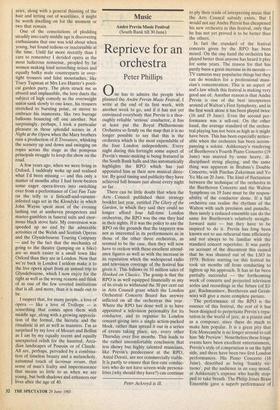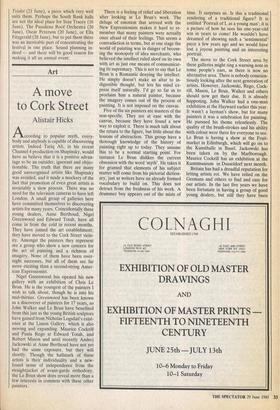Music
Andre Previn Music Festival (South Bank till 30 June)
Reprieve for an orchestra
Peter Phillips
0 ne has to admire the people who planned the Andre Previn Music Festival. I
write at the end of its first week, with another week to go, and if it has not yet convinced everybody that Previn is a thor-
oughly reliable 'serious' conductor, it has at least put the Royal Philharmonic Orchestra so firmly on the map that it is no longer possible to say that this is the orchestra which is the most expendable of the four London independents. Every night during this fortnight some aspect of Previn's music-making is being featured in the South Bank halls and this automatically highlights the RPO which has just appointed him as their new musical direc- tor. By good timing and publicity they have achieved full houses just about every night so far.
There can be little doubt that when the Arts. Council published their strategy booklet last year, entitled The Glory of the Garden, in which they said they could no longer afford four full-time London orchestras, the RPO was the one they had in their sights. If it was the policy to axe the RPO on the grounds that the taxpayer was not as interested in its performances as in those of the other three orchestras, as seemed to be the case, then they will now have to reckon with these excellent attend- ance figures as well as with the increase in its reputation which the widespread radio and television coverage of the festival has given it. This follows its 10 million sales of Hooked on Classics. The gossip is that the RPO is as well equipped financially as any of its rivals to withstand the 30 per cent cut in Arts Council grant which the London Orchestral Concerts Board has anyway inflicted on all the orchestras this year. Where the RPO has done well is to have appointed a television personality for its conductor, and to organise its London concert-giving into a single action-packed block, rather than spread it out in a series of events taking place, say, every other Thursday over five months. This leads to the rather uncomfortable conclusion that less showy but highly talented musicians, like Previn's predecessor at the RPO, Antal Dorati, are not commercially viable. It is partly to ensure that first-rate conduc- tors who do not have screen-wide persona- lities (why should they have?) can continue
to ply their trade of interpreting music that the Arts Council subsidy exists. But I would not say Andre Previn has cheapened his new orchestra in this festival, only that he has not yet proved it to be better than the others.
In fact the standard of the festival concerts given by the RPO has been mixed. On the one hand the orchestra has played better than anyone has heard it play for some years. The reason for that has partly been a great increase in its morale — TV cameras may popularise things but they can do wonders for a professional musi- cian's concentration. This is an aspect of sod's law which this festival is making very good use of. Another reason is that Andre Previn is one of the best interpreters around of Walton's First Symphony, and in the first week alone it has been played twice (16 and 19 June). Even the second per- formance was a sell-out. On the other hand, the average standard of the orches- tral playing has not been as high as it might have been. This has been especially notice- able when the orchestra has been accom- panying a soloist. Ashkenazy's rendering of Beethoven's Fourth Piano Concerto (19 June) was marred by some heavy, ill- disciplined string playing, and the same thing was apparent in Brahms's Double Concerto, with Pinchas Zukerman and Yo Yo Ma on 20 June. The kind of fluctuation between the technique of the orchestra in the Beethoven Concerto and the Walton Symphony on 19 June must be the respon- sibility of the conductor alone. If a full orchestra can realise the rhythms of the Walton with such precision and panache, then surely a reduced ensemble can do the same for Beethoven's relatively straight- forward tuttis — but they have to be inspired to do it. Previn has long been known not to use rehearsal time efficiently and not always to be familiar with the standard concert repertoire. It was partly on account of the discontent this caused that he was shunted out of the LSO in
1979. Before starting on this festival he took six months off from conducting to tighten up his approach. It has so far been partially successful — the forthcoming week of concerts and projected television series and recordings in the future (of El- gar, Rachmaninov, Beethoven and Gersh- win) will give a more complete picture.
The performance of the RPO is the essence of this festival, the rest of it has been designed to perpetuate Previn's repu- tation in the world of jazz, as a pianist and as a composer. since these do much to make him popular. It is a great pity that Eric Morecambe is no longer around to call him 'Mr Preview'. Nonetheless these fringe events have been excellent entertainment, Previn's style of composition is on the light side, and there have been two first London performances. His Piano Concerto (16 June), described as being 'frankly vir- tuoso', put the audience in an easy mood, at Ashkenazy's expense who hardly stop- ped to take breath. The Philip Jones Brass Ensemble gave a superb performance of
Trio/es (21 June), a piece which very well suits them. Perhaps the South Bank halls are not the ideal place for Stan Tracey (16 June), The Pasadena Roof Orchestra (20 June), Oscar Peterson (20 June), or Ella Fitzgerald (28 June), but to put them there was an inevitable part of concentrating the festival in one place. Sound planning in- deed — and there will be good reason for making it all an annual event.



























































 Previous page
Previous page